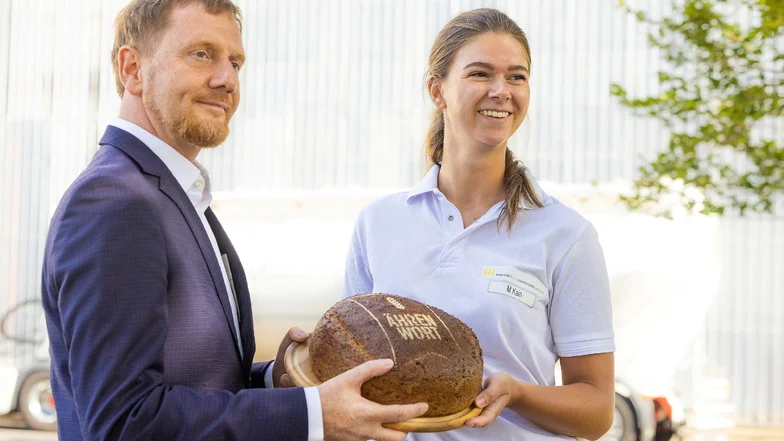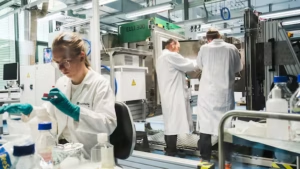Von Georg Moeritz
Dresden. Duftende Croissants und Sachsendreier-Brötchen zum Frühstück, dazu eine gute Nachricht und eine schlechte: So hat Michael Gutting am Montag um 8 Uhr Sachsens Ministerpräsidenten Michael Kretschmer (CDU) an der Hafenmühle in Dresden empfangen. Gutting und seine Familie besitzen zehn Mühlen in ganz Deutschland, seit 2014 auch die Dresdener Mühle GmbH. Der Konzern Bindewald und Gutting hat viel vor mit Sachsens größter Getreidemühle mit ihren 73 Beschäftigten: Die Kapazität soll um die Hälfte erhöht werden.
Gutting sagte, rund 40 Millionen Euro stünden für den Ausbau bereit. Doch dann die schlechte Nachricht: „Wir investieren hier am Standort – oder an einem Standort, wo es möglich ist.“ Der schmucke Industriebau von 1913 könnte demnach auch aufgegeben werden.

Die Dresdner Geschäftsführer Dirk Willkomm und Norman Krug sagten auf Nachfrage zu möglichen Umzugsplänen, noch sei nichts entschieden. Schon länger gibt es Gerüchte aus der Branche, nach denen das Unternehmen einen möglichen Neubau in einem Gewerbegebiet westlich von Dresden an der Autobahn ins Auge fasst – falls ein Ausbau am Traditionsstandort nicht gelingt. „Man muss schauen, was wir hier genehmigt bekommen“, sagte Krug. Das denkmalgeschützte Mühlengebäude mit seinem 63 Meter hohen Turm lasse sich nicht aufstocken. Die Nachbarn seien der Alberthafen und das Deutsche Rote Kreuz, ringsum sei wenig Platz. „Wir müssen in die Höhe bauen.“ Das Unternehmen sei mit den Behörden im Gespräch.
Dresdener Mühle muss 60 Mehlmischungen separat lagern
Willkomm sagte, das Unternehmen sei „sehr flexibel, was die Anpassung der Baupläne angeht“. Künftig brauche das Unternehmen jedenfalls mehr Lagerplatz für verschiedene Getreidesorten, mehr Mehlsilos und eine neue Verladeanlage. „Unsere Kundschaft entwickelt sich weiter, wir lassen regionale Getreide anwendungsbezogen anbauen“. Damit ist gemeint, dass die Mühle immer mehr Sorten liefert: 67 Getreidequalitäten und bis zu 60 Mehlmischungen müssen separat verarbeitet und gelagert werden, sagte der Geschäftsführer. Weizenvollkornmehl ist dabei und Dinkelschrot, Roggen gequetscht und flockiert.
Ein Teil des sächsischen Mehls wird unter der Marke Kathi verkauft, auch Bahlsen in Berlin ist ein Kunde der Dresdner. Im Festzelt für den Empfang Kretschmers lehnten zur Dekoration 25-Kilo-Säcke mit der Aufschrift „Dresdener Stollenmehl“, aber auch „staubarmes Prozessmehl“. Etwa ein Viertel der Markenmehle wird exportiert. Jeden Tag mahlt die Dresdener Mühle etwa 600 Tonnen Getreide. Die Menge hat schon kräftig zugenommen: 1987 wurden täglich 125 Tonnen vermahlen.

Die Rohstoffe kommen aus maximal 100 Kilometern Entfernung, betonen die Chefs. 90 Prozent des Getreides für die Dresdener Mühle wachse in Sachsen. Ein eigener Fuhrpark mit 23 Fahrzeugen beliefert die Kunden – auf den langen Lastern steht außer „Dresdener Mühle“ auch „Saalemühle“, denn mit dem Betrieb in Alsleben arbeitet der sächsische eng zusammen. Außerdem kommen die Lehrlinge aus den anderen Betrieben des Konzerns zu Schulungen nach Dresden.
200 sächsische Bäcker nutzen Mehl der Marke Ährenwort
Die Dresdener Mühle soll künftig 300.000 statt 200.000 Tonnen pro Jahr verarbeiten, wenn es nach Michael Gutting geht. Zum Vergleich: Voriges Jahr wurden laut Agrarbericht in Sachsen 2,6 Millionen Tonnen Getreide geerntet. Zum Mahlen sei in der vorhandenen Mühle noch genügend Platz, sagte Willkomm. Auch um den Nachschub mache er sich keine Sorgen: Die rund 200 Landwirtschaftsbetriebe, die an die Mühle liefern, könnten einen größeren Teil ihrer Ernte an sie verkaufen, und der Kreis könne noch erweitert werden.

Etwa 200 Bäcker kaufen das Dresdner Mehl über das Programm „Ährenwort“, mit dem sie genau die Herkunft erfahren. Landesobermeister Stefan Richter aus Kubschütz nannte es ein „großes Glück, dass wir regionale Mühlen haben“. Kurze Wege seien umweltfreundlich. Richter kauft auch in der Rätzemühle in Spittwitz und in der Neumühle in Rennersdorf bei Herrnhut.
Ehemaliger Bauernpräsident Vogel: Ernte „durchwachsen“
Die meisten Bäcker seien ihren Mühlen treu. Das gilt auch für Lukas Claus aus Coswig, Juniorchef von rund 100 Beschäftigten mit neun Verkaufsstellen. Die Bäckerei kauft zwar viele Zutaten über die Einkaufsgenossenschaft Bäko, aber ihr Weizen und Roggen kommen aus der Dresdener Mühle. Für den Coswiger würde es keinen Unterschied machen, wenn der Mühlenbetrieb künftig außerhalb Dresdens liefe.

Sachsens ehemaliger Bauernpräsident Wolfgang Vogel war als Mit-Initiator des Programms Ährenwort auch zum Mühlenfrühstück geladen. Vogel berichtete, die Getreideernte sei in Sachsen so gut wie fertig, außer im Gebirge. „Durchwachsen“ sei die Ernte ausgefallen. Vogel zeigte sich besorgt, ob Sachsen künftig noch genügend Qualitätsweizen produzieren könne – die Düngeverordnung verlangt zum Schutz des Grundwassers weniger Nitrat-Einsatz. Mehrmals haben Bauern gegen die Festlegung von „roten Gebieten“ auf Landkarten protestiert, in denen das Düngen beschränkt ist. Vogel sagte, solche Einschränkungen könnten wie schon in Dänemark dazu führen, dass mehr Qualitätsweizen importiert werden müsse.
Ministerpräsident Kretschmer suchte das Gespräch mit Beschäftigten der Mühle, mit Fahrern und Laborantinnen. In einer kurzen Wahlkampfrede erinnerte er an den bevorstehenden Neubau der Mikrochipfabrik des Investors TSMC aus Taiwan: „Wir müssen dafür sorgen, dass die Mitarbeiter nicht aus Handwerk und Mittelstand abgezogen werden“, sagte Kretschmer. Geschäftsführer Krug sagte zur Begründung für den Betriebsbesuch: „Wir wollen den Ministerpräsidenten unterstützen“. Die Wirtschaft brauche eine klare Politik.








